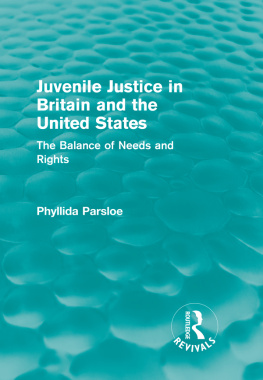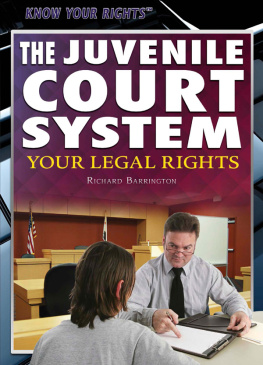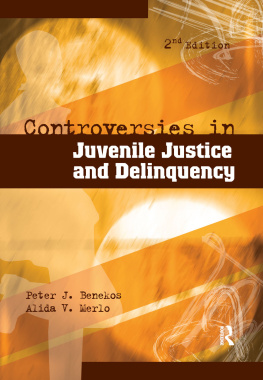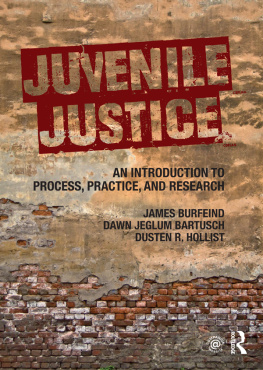JUVENILE JUSTICE IN GLOBAL PERSPECTIVE
YOUTH, CRIME, AND JUSTICE SERIES
General Editors: Franklin E. Zimring and David S. Tanenhaus
Homeroom Security: School Discipline in an Age of Fear
Aaron Kupchik
Kids, Cops, and Confessions: Inside the Interrogation Room
Barry C. Feld
Choosing the Future for American Juvenile Justice
Edited by Franklin E. Zimring and David S. Tanenhaus
Juvenile Justice in Global Perspective
Edited by Franklin E. Zimring, Mximo Langer, and David S. Tanenhaus
Juvenile Justice in Global Perspective
Edited by Franklin E. Zimring, Mximo Langer, and David S. Tanenhaus
NEW YORK UNIVERSITY PRESS
New York and London
NEW YORK UNIVERSITY PRESS
New York and London
www.nyupress.org
2015 by New York University
All rights reserved
References to Internet websites (URLs) were accurate at the time of writing. Neither the author nor New York University Press is responsible for URLs that may have expired or changed since the manuscript was prepared.
Library of Congress Cataloging-in-Publication Data
e-ISBN: 978-1-4798-3800-4
Juvenile justice in global perspective / edited by Franklin E. Zimring, Mximo Langer, and David S. Tanenhaus.
pages cm(Youth, crime, and justice series)
Includes bibliographical references and index.
ISBN 978-1-4798-2653-7 (cl: alk. paper)
1. Juvenile justice, Administration of. I. Zimring, Franklin E., editor. II. Langer, Mximo, editor. III. Tanenhaus, David Spinoza, editor. IV. Series: Youth, crime, and justice series.
K5575.J86 2015
364.36dc23 2015004162
For Toni Mendicino, with our gratitude and admiration
Contents
Franklin E. Zimring, Mximo Langer, and David S. Tanenhaus
Frieder Dnkel
Tapio Lappi-Seppl
Weijian Gao
Ved Kumari
Mary Beloff and Mximo Langer
Lena Salaymeh
Barbara Stado-Kawecka
Ann Skelton
Jae-Joon Chung
Franklin E. Zimring and Mximo Langer
The central financial and administrative support for this project came from the Criminal Justice Research Program at Berkeley Law with funds from the Berkeley Law School. The planning and scheduling of the volume also had the support of NYU Press.
Our largest personal debts are to the individual scholars who met the novel challenges of contributing chapters to this collection. Many of the profiles in this volume are the first in English for the nations represented, and all of them also involve comparisons between juvenile and criminal justice systems. Most chapters provide empirical data to supplement statutory and doctrinal information, and many of the scholars who prepared these chapters were writing in a second language. The efforts and enthusiasm of our contributors were nothing short of inspirational.
Ricardo Lillo compiled an extensive statistical profile of juvenile and criminal custodial data from several Latin American nations, which enriched the profile of juvenile justice in Latin America.
Toni Mendicino is always an indispensable resource in producing the published work of the Criminal Justice Research Program, but the range of her contributions to this effort was remarkable. She served as administrator, travel planner, content editor, and coordinator and displayed important diplomatic skills at critical junctures.
FRANKLIN E. ZIMRING, MXIMO LANGER, AND DAVID S. TANENHAUS
Juvenile courts are both a very recent legal invention and an almost ubiquitous presence in modern nations. The first juvenile court was established by statute in Illinois in 1899 and quickly spread to other American states and to a number of other nations. Both the jurisdictional features and policy ambitions of the Illinois juvenile court were widely emulated in the systems that were established worldwide in the first half of the 20th century. And there is one important feature of every juvenile courts delinquency jurisdiction that complicates the task of creating a comparative law of juvenile courts. When juvenile courts are introduced in a legal system, they remove a segment of young offenders that had been traditionally the responsibility of criminal courts. So every juvenile court becomes part of a dual legal system of responding to criminal offensesa juvenile court for young offenders and a criminal court for adult offenders. One critical dimension of every nations juvenile court system is the differences in outcome, process, and philosophy between juvenile and criminal courts. This means that the comparative law of juvenile justice is best regarded as a process of double comparison in which juvenile justice systems are compared both to the juvenile systems of other places and to the criminal courts that they coexist with.
The Usual Suspects
This book has three complementary ambitions. The first goal of the volume is to substantially increase both the number of juvenile justice systems that are profiled in English-language scholarship and the variety of geographical, political, and religious contexts in which juvenile courts have been observed. The modest efforts to date at comparative analysis of juvenile justice have focused on systems found in Western developed nations. There is a substantial literature on a relatively small sample of nationsCanada, England, France, Germany (Tonry and Doob 2004) and (for geographic diversity) eastern Europe (Dnkel and Drenkhahn 2003; Dnkel, Grzywa, Horsfield, and Pruin 2011; Junger-Tas and Decker 2006) and Japan (Muncie and Goldson 2006). But the sample of nations where juvenile justice has been profiled is both small and unrepresentative (Hartjen 2008; Jensen and Jepsen 2006). These are the rich nations, mostly Western and tending toward democracy and political stability.
Our first aim is to create in these pages a much wider world map of juvenile justice systems, one that comes closer to approximating the near universality of juvenile justice in the modern world. We think that profiles of juvenile courts in places such as India, the Peoples Republic of China, Latin America, and the Middle East can provide readers with a much more representative sample of current systems and a better test of whether the features found in Canada and western Europe are more widely shared and thus qualify as essential characteristics of juvenile justice or are simply a variant found in Western developed democracies. The individual chapters on these understudied systems will be useful in two ways: (1) individually, as an introduction to the specific national systems discussed, and (2) collectively, as a wider sample of the variety of juvenile justice systems now functioning. How many different types of juvenile systems currently exist, and how do they differ? What characteristics other than the common label unify juvenile systems in different regions and in different forms of government?
A second ambition of this study is to seek knowledge of the operations of juvenile justice using the double-comparison perspective that seeks to explore the special features of a nations juvenile system by comparing it to the operations and ideology of the criminal justice system that it adjoins. So we want to find the special character of a specific juvenile system by comparison with its domestic criminal justice sibling as well as with the juvenile justice systems of other nations. This type of two-dimensional mapping can create a much more complicated location of particular systems but one that provides important clues about why juvenile systems may differ from one another and also why there may be characteristic differences in emphasis and operation among juvenile systems in many different national environments and the criminal systems next door to them. In this context, we have included in our case studies not only politically stable countries but also countries that have undergone major political transitions, to explore whether any relevant differences exist between these two types of political situations. We hope a double-comparison perspective produces important hypotheses in this study even if the data we collect will fall far short of supplying definitive answers.








